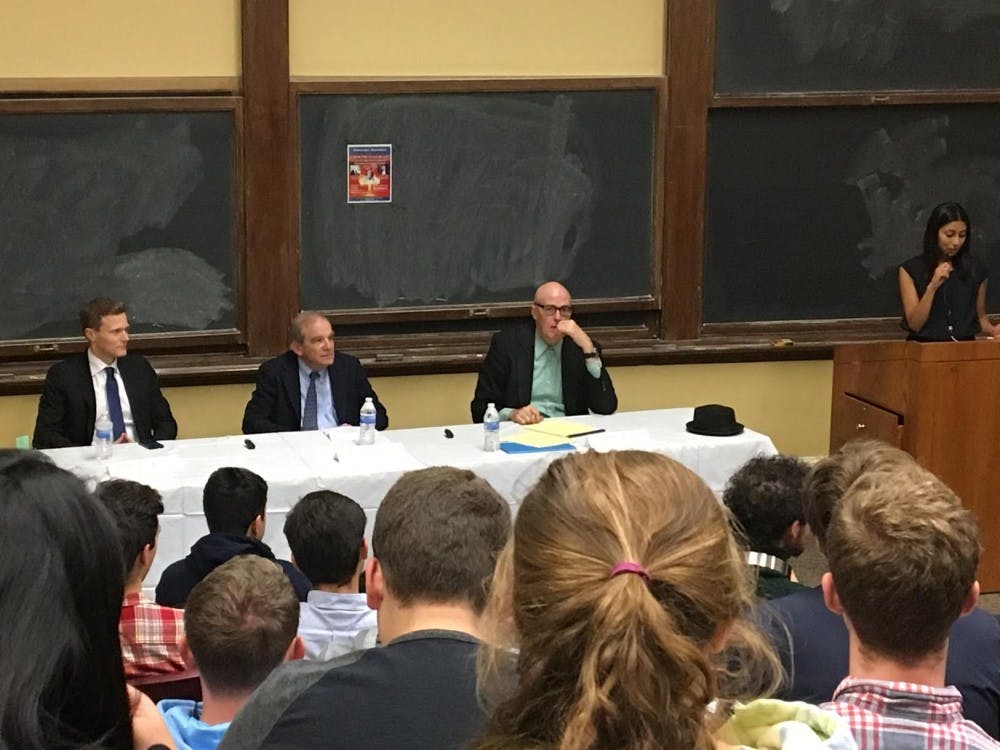The Alexander Hamilton Society hosted a debate between professors followed by a Q&A session on whether the U.S. should modernize or abolish its nuclear weapon programs on Wednesday night.
Guest speaker Matthew Kroenig, associate professor of government at Georgetown University, argued on behalf of modernization, while Daniel Deudney, associate professor of political science at Hopkins, spoke against developing new nuclear weapons. Steven David, professor of political science at Hopkins, served as moderator.
Kroenig opened the debate, highlighting the role of nuclear weapons in deterring international conflicts. He said that the end goal of developing weapons is to prevent, not start, war.
“We haven’t had conflict among major powers since 1945. Most international relations scholars believe that it is in large part due to nuclear weapons,” Kroenig said.
He said that modernizing weapons has become necessary due to increasing tensions between the U.S. and rival powers like Russia and North Korea. He pointed out that the majority of American nuclear weapons were developed in the 1970s and ‘80s and compared the need to modernize nuclear weapons to that of updating old cars.
“Unfortunately times are changing. Great power politics are reemerging. The nuclear threat is worse than it has been probably since the late 1980s,” Kroenig said. “We need to start taking nuclear deterrence and our nuclear weapons policy seriously again.“
In his counter points, Deudney asserted that there is no way to return to a world without nuclear weapons and recommended a “two-sided approach.”
“On one side, we need to maintain readiness to deter various rivals,” he said. “On the other hand we need to attempt to persuade other states that relying on nuclear weapons to resolve international conflicts is a fundamentally intolerable situation, and we need to move resolutely towards a world where this is not the case.”
Deudney emphasized the destructive power of nuclear weapons and the potential unreliability of those who control them.
“Humans in the past were like children playing with matches. Today humans are like children playing with flame throwers,” Deudney said. “The consequences are too great.”
The moderator, David, pressed each of the debaters to elaborate on their arguments. He asked Kroenig to justify the budget that would go into updating the nation’s nuclear weapons.
“We have a lot of problems here at home. The city of Baltimore is decaying, there are budget issues and healthcare issues. Americans already have tons of weapons,” David said, “It is unthinkable that anyone out there could disarm the American arsenal, so why do we need to spend so much money if other countries can’t attack us?”
Kroenig addressed David’s questions by first noting that other countries might not necessarily know how large the U.S. arsenal is and that they might still attempt a nuclear attack. He added that the cost of modernizing the nation’s nuclear weapons would make up only five percent of the defense budget.
“Is five percent too much to spend on the ultimate security guarantee for the U.S. and the entire free world?” he said.
David also asked Deudney to defend his stance which called for alternatives to nuclear weapons. In response, Deudney emphasized the need to enhance diplomacy.
President of the Alexander Hamilton Society and senior Ben Gaal reflected on the debate, saying that both speakers articulated their points effectively. He was also pleased with student engagement.
“It’s great that we were able to bring in a speaker from another campus, who has a completely different perspective than a Hopkins professor, and were able to engage in a civil debate,” Gaal said. “Students were willing to listen to both sides... we’re proud that we were able to put on an event like that.”
Freshman Kristofer Madu said that the debate was informative.
“The expositions on the topic that were provided by both of the participants were enlightening,” Madu said. “That’s the main point of a debate.”





